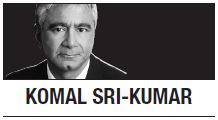The landslide victory of President Emmanuel Macron’s party in the second round of the French parliamentary elections on Sunday -- and the defeat in several Italian local elections of the anti-Europe Five Star Movement party a few days earlier -- raises an intriguing question for global investors. Could the eurozone finally become a truly economically unified area? If so, producers in the region will be better able to take advantage of economies of scale that are already created by free trade within the area, and through the mobility of capital and labor.
Structural reforms, especially flexibility of wages to boost export competitiveness, were initiated in Germany in 2003 by then-Chancellor Gerhard Schroeder, and remain the backbone of the country’s better economic prospects compared with other countries in the region. France and Italy, the second- and third-largest countries in the eurozone, were the perennial laggards. The heavy tax burden on businesses to pay for social benefits, and contentious labor negotiations relating to salaries and layoffs, have caused companies to think twice before locating in the two countries.
The success of Macron’s La Republique en Marche is all the more amazing because his movement is only a year old, and the landslide victory is the largest for a party in a quarter century. Equally impressive, Macron took the risk of campaigning on a platform of promoting labor market flexibility and lowering French business costs by reducing taxes. With the substantial majority that REM enjoys in the National Assembly, he expects to have sufficient negotiating ability in the tough talks with the unions that are likely to follow. Macron hopes to pass some of the measures to lift profitability as early as next month.
From investors’ points of view, the Macron measures, if implemented, would allow France to serve as Germany’s like-minded partner in market-friendly moves. Especially during the presidency of Macron’s predecessor, Francois Hollande, France’s ability to behave as the co-architect of the eurozone was limited by anti-business policies and the government‘s low popularity.
Cause for optimism also came from the results of local elections in Italy on June 11. The Five Star Movement was unable to reach the runoffs in any of the 25 provincial capitals that were in contention, with the party losing even in Genoa, the hometown of the party leader Beppe Grillo. The poor performance was taken as a positive signal by investors in anticipation of nationwide elections that must be held by May 2018.
Market reaction to political developments in France and Italy was best expressed by the yield spread of the countries’ 10-year bonds with respect to German bonds, the region’s benchmark of “risk-free” debt. The French debt spread fell below 35 basis points on Monday following Macron’s party’s big victory. This was the narrowest the spread has been since last November. In Italy, the spread of 167 basis points was the smallest since January.
Obviously, there is more progress to be made. But after a spring when markets feared that the far-right anti-euro National Front would win the presidency in France, and the steady lead that the Five-Star Movement previously had in polls in Italy, recent developments should be viewed as positive surprises. Furthermore, any positive reaction of the French economy to the Macron measures could also strengthen pro-market forces in Italy ahead of elections.
If the three largest eurozone countries are able to work together, the potential would be substantial for equity markets to move up substantially. For one thing, the collective equity market capitalization of the three countries -- Germany, $2.2 trillion; France, $2.3 trillion; and Italy, $0.6 trillion -- is substantially smaller than the US’ $27.1 trillion, suggesting there is considerable room to move up if the governments introduce favorable tax and labor-market laws.
Even more significant than the relatively limited stock markets in Germany, France and Italy are the substantially smaller ratios of equity market capitalization to gross domestic product in the three countries compared with the US. While the capitalization is 151 percent of GDP in the US, the ratios are 65 percent, 97 percent and 35 percent in Germany, France and Italy, respectively. If the eurozone can better coordinate policies to attract investments, international finance theory would suggest the gap between the European countries’ and US ratios should narrow.
---
By Komal Sri-Kumar
Komal Sri-Kumar is the president and founder of Sri-Kumar Global Strategies, and former chief global strategist of Trust Company of the West. -- Ed.
(Bloomberg)

![[Exclusive] Korean military set to ban iPhones over 'security' concerns](http://res.heraldm.com/phpwas/restmb_idxmake.php?idx=645&simg=/content/image/2024/04/23/20240423050599_0.jpg&u=20240423183955)

![[Graphic News] 77% of young Koreans still financially dependent](http://res.heraldm.com/phpwas/restmb_idxmake.php?idx=645&simg=/content/image/2024/04/22/20240422050762_0.gif&u=)


